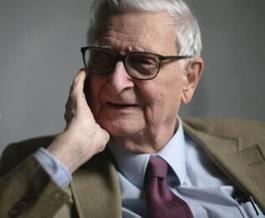 |
|
| E.O. Wilson | |
Edward O. Wilson, a biologist and author who conducted pioneering work on biodiversity, insects and human nature--and won two Pulitzer Prizes--died December 26, the New York Times reported. He was 92.
"Ed's holy grail was the sheer delight of the pursuit of knowledge," said Paula J. Ehrlich, CEO and president of the E.O. Wilson Biodiversity Foundation. "A relentless synthesizer of ideas, his courageous scientific focus and poetic voice transformed our way of understanding ourselves and our planet."
When Wilson began his career in evolutionary biology in the 1950s, "the study of animals and plants seemed to many scientists like a quaint, obsolete hobby," the Times wrote. "Molecular biologists were getting their first glimpses of DNA, proteins and other invisible foundations of life. Wilson made it his life's work to put evolution on an equal footing....
"As an expert on insects, Wilson studied the evolution of behavior, exploring how natural selection and other forces could produce something as extraordinarily complex as an ant colony. He then championed this kind of research as a way of making sense of all behavior--including our own." He also became a pioneer in the study of biological diversity.
Wilson wrote more than 30 books that influenced his fellow scientists while also often gaining a general readership. On Human Nature won the Pulitzer Prize for general nonfiction in 1979, and The Ants, which Wilson wrote with his longtime colleague Bert Hölldobler, won him his second Pulitzer in 1991. Wilson's other books include The Theory of Island Biogeography (with Robert MacArthur); The Insect Societies; Sociobiology: The New Synthesis; The Social Conquest of Earth; A Window on Eternity; Half-Earth: Our Planet's Fight for Life; and Naturalist.
In the 1980s, he "began the third great project of his career, as a champion of the world's wild places," the Times noted. "By then, his earlier work on island biogeography was taking on a terrifying new importance. As humankind reduced rainforests and other habitats to fragments, countless species were being pushed toward extinction. Wilson took up the dangers of extinction in his 1992 bestselling book, The Diversity of Life."
After retiring from Harvard University in 2002, Wilson published more than a dozen books, including a digital biology textbook for the iPad. In retirement, he "continued to use his fame to draw attention to biodiversity. In 2008, he unveiled the Encyclopedia of Life, a website that will eventually house information about every known species."

